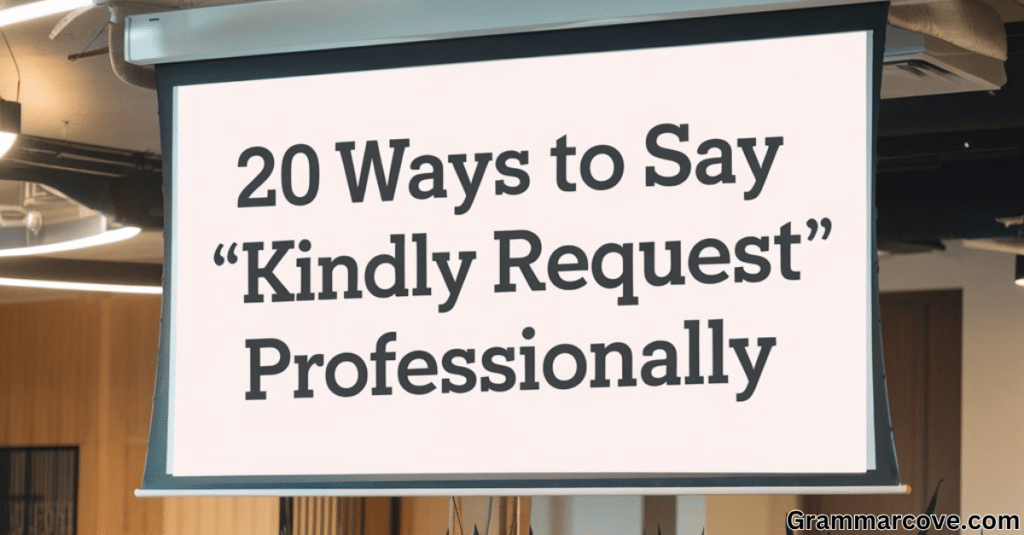In the world of professional communication, crafting the right message can make a huge difference. Whether you’re writing an email, crafting a letter, or simply making a request, respectful language in business is essential. One of the most commonly used phrases, “kindly request,” is often seen as polite and formal, but it’s important to vary your language to keep your communication fresh and engaging.
In this article, we’ll explore 20 ways to say “kindly request” professionally. We’ll also provide examples and scenarios for each expression, so you can confidently navigate various situations with polite request synonyms and formal language in correspondence. From courteous appeal to respectful request language, these alternative phrases will help you refine your business email etiquette and enhance your overall professional tone in requests.
Here’s the list of 20 ways to say “Kindly Request”
- I would appreciate it if
- I would be grateful if
- Could you please
- I would like to request
- Would you mind
- I would be thankful if
- May I ask
- Could you kindly
- Would it be possible to
- I would like to ask
- Could you please consider
- I would appreciate your assistance with
- Might I request
- Would you be so kind as to
- I would like to know if
- I would be obliged if
- Could you kindly assist
- Please be so kind as to
- I would like to request your permission
- I hope you don’t mind
1. I Would Appreciate It If
When you want to make a request that feels both professional and polite, this phrase works wonders. It’s a great way to soften your tone and show appreciation in advance.
Scenario Example:
Subject: Request for Meeting Availability
Hi Sarah,
I hope you’re doing well. I would appreciate it if you could provide your availability for a meeting next week. Looking forward to your response.
Best regards,
Tom
In this case, “I would appreciate it if” offers a respectful, yet clear, way to ask for someone’s time without sounding too direct.
2. I Would Be Grateful If
This phrase is another polite way to ask, conveying gratitude for the action you’re requesting. It strikes a balance between formality and warmth.
Scenario Example:
Subject: Documents for Review
Dear Alex,
I would be grateful if you could send over the latest version of the report by tomorrow. Your help is greatly appreciated.
Kind regards,
Emma
Here, “I would be grateful if” enhances the level of politeness, showing genuine appreciation for Alex’s cooperation.
3. Could You Please
For situations where you want to be courteous but more direct, “could you please” works as a professional and polite option. It maintains a friendly tone while still making a clear request.
Scenario Example:
Subject: Request for Information
Dear John,
I hope this email finds you well. Could you please provide the updated client list by the end of the day?
Thank you in advance,
Susan
In this example, “could you please” is an efficient way to ask while maintaining formal business requests.
4. I Would Like to Request
This phrase is more neutral but still carries the formal tone that makes it suitable for formal language in emails or letters. It’s polite, professional, and to the point.
Scenario Example:
Subject: Request for Time Off
Hi Rebecca,
I would like to request two days off next month for a family event. Please let me know if this works with the team’s schedule.
Best,
David
Here, “I would like to request” is a straightforward and formal way to request something without being overly demanding.
5. Would You Mind

This is an excellent way to soften a request, making it feel less like a demand. It shows consideration for the other person’s time or effort.
Scenario Example:
Subject: Follow-Up on Report
Hi Mark,
I hope everything is going well. Would you mind reviewing the draft report and sharing your feedback by the end of the week?
Regards,
Rachel
In this case, “would you mind” provides a respectful request language that invites cooperation without sounding pushy.
6. I Would Be Thankful If
This phrase conveys gratitude and adds a layer of deference to your request. It’s a perfect choice for maintaining a formal tone in communication.
Scenario Example:
Subject: Request for Payment Update
Dear Olivia,
I would be thankful if you could provide an update on the payment status for the last invoice.
Best regards,
James
Here, “I would be thankful if” brings warmth and gratitude to the request, which helps maintain positive communication.
7. May I Ask
This is a polite entreaty that works especially well when you’re trying to make a request in a gentle, non-intrusive manner. It’s a more formal alternative to asking directly.
Scenario Example:
Subject: Request for Clarification
Dear Emily,
May I ask for clarification on the proposed deadline for the project? It will help me plan the next steps accordingly.
Thank you,
Greg
Using “may I ask” adds an extra layer of respectful language in business, ensuring that you’re being both clear and courteous.
8. Could You Kindly
This phrase is a variation of “could you please”, and it works especially well for more formal requests. It softens the tone while still maintaining professionalism.
Scenario Example:
Subject: Request for Feedback
Hi Jessica,
Could you kindly review the attached proposal and provide your thoughts? Your feedback is invaluable.
Best regards,
Michael
“Could you kindly” strikes a balance between polite request alternatives and a formal tone, making it ideal for professional emails.
9. Would It Be Possible to
This is a slightly more formal way to ask for something. It is often used in business communication when you want to suggest a possibility rather than making a direct demand.
Scenario Example:
Subject: Extension Request
Dear Hannah,
I hope you’re doing well. Would it be possible to extend the deadline for the project by a few days? It will allow us to ensure the highest quality of work.
Regards,
Ben
Here, “would it be possible to” helps frame the request in a way that is respectful and acknowledges the recipient’s control over the decision.
10. I Would Like to Ask

This is a more casual yet still formal way to make a request. It’s a great alternative when you need to ask something but want to keep it respectful.
Scenario Example:
Subject: Confirmation of Meeting Time
Hi Steve,
I would like to ask if the meeting time for tomorrow still works for you. Please let me know.
Best,
Laura
Using “I would like to ask” maintains the polite phrasing in letters while keeping the tone friendly and respectful.
11. Could You Please Consider
This phrase is often used when asking someone to think about a request or proposal. It shows respect for the recipient’s time and decision-making process.
Scenario Example:
Subject: Proposal for New Marketing Strategy
Hi Claire,
Could you please consider the attached proposal for the new marketing strategy and let me know your thoughts?
Best,
Daniel
Here, “could you please consider” introduces a respectful way to make a suggestion or request for action.
12. I Would Appreciate Your Assistance With
This phrase is great when you need someone’s help but want to remain formal and appreciative of their time.
Scenario Example:
Subject: Request for Assistance
Dear Mary,
I would appreciate your assistance with organizing the upcoming conference. Please let me know how I can support the planning.
Best regards,
Robert
By saying “I would appreciate your assistance with”, you’re presenting your request with deferential request expressions that show gratitude.
13. Might I Request
This is a more formal way to phrase a request. It shows extra consideration and deference, making it suitable for highly formal situations.
Scenario Example:
Subject: Request for Report Submission
Dear Dr. Wilson,
Might I request that you submit the quarterly report by next Friday?
Sincerely,
Olivia
“Might I request” is often used in formal business requests or situations where showing extra respect is important.
14. Would You Be So Kind As To
This is one of the most formal ways to make a request. It’s an excellent option when you want to show utmost politeness in formal language in emails.
Scenario Example:
Subject: Request for Document Access
Hi Paul,
Would you be so kind as to send me the access details for the new software platform?
Thank you,
Jennifer
“Would you be so kind as to” adds a touch of humility and respect, making your request sound extremely courteous.
15. I Would Like to Know If

When you’re making a request for information or clarification, this is a great way to ask without sounding too direct.
Scenario Example:
Subject: Inquiry About Upcoming Event
Dear Anna,
I would like to know if the training event is still scheduled for next month.
Thank you,
Tom
This phrase is great for requesting professionally when you want to keep the tone respectful yet direct.
16. I Would Be Obliged If
This is a highly formal and polite way to make a request, often used in business correspondence when you need to express sincere gratitude.
Scenario Example:
Subject: Payment Inquiry
Dear Caroline,
I would be obliged if you could confirm the status of my payment for the services rendered.
Sincerely,
Mark
“I would be obliged if” creates a very respectful, professional tone, making it ideal for formal business communication.
17. Could You Kindly Assist
This is another variation of “could you kindly” that works well in professional settings. It’s often used when you need assistance with something.
Scenario Example:
Subject: Technical Support Request
Hi Tom,
Could you kindly assist me with accessing the client database? I’m having some trouble logging in.
Best regards,
Anna
Here, “could you kindly assist” offers a polite, formal request phrase while maintaining professionalism.
18. Please Be So Kind As To
This phrase is another highly formal and respectful way to request something from someone. It is often used in more traditional business contexts.
Scenario Example:
Subject: Request for Meeting Notes
Dear Mike,
Please be so kind as to send over the notes from the meeting last week.
Best regards,
Claire
This polite phrasing in letters adds a level of professionalism that fits well in more traditional business communication.
19. I Would Like to Request Your Permission
This is a polite way to ask for approval or consent, especially in more formal settings.
Scenario Example:
Subject: Request for Leave Approval
Hi Sarah,
I would like to request your permission to take a few days off next month for personal reasons.
Best regards,
David
This phrasing works well in formal business requests and when you need to show respect for the recipient’s authority.
20. I Hope You Don’t Mind

This phrase is a bit more casual but still polite and professional. It’s often used when asking for a small favor or favor that might require some effort from the recipient.
Scenario Example:
Subject: Request for Assistance
Dear James,
I hope you don’t mind helping me with the presentation slides for tomorrow’s meeting. Your assistance would be greatly appreciated.
Best regards,
Rachel
Here, “I hope you don’t mind” softens the request and makes it feel less like an imposition.
Conclusion
Mastering the art of requesting professionally can significantly improve your communication skills. By using these professional request phrases, you not only convey your message effectively but also maintain respectful language in business. Remember, the key is to vary your expressions based on the situation and recipient. Whether you’re making a polite request synonym or opting for a more formal tone in communication, these alternatives for kindly request will help you sound confident, courteous, and professional. Keep these phrases in your toolkit, and you’ll be ready for any request that comes your way!


